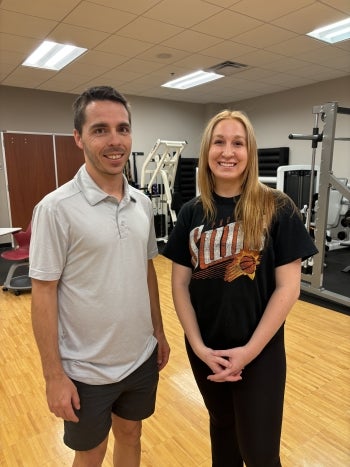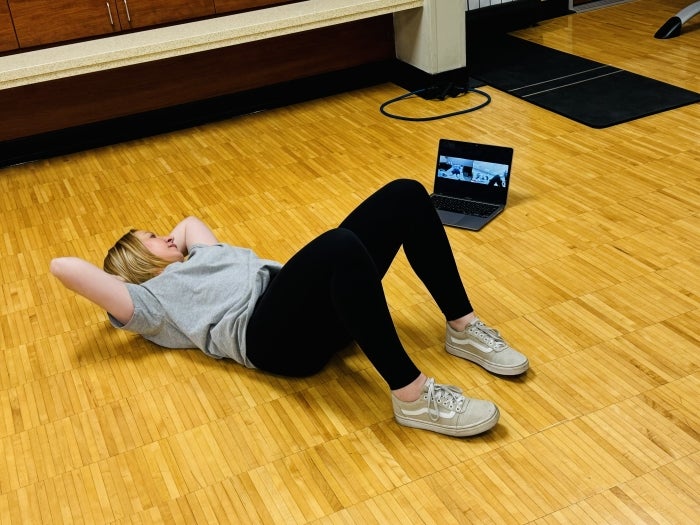College of Health Solutions student making a difference in community, her own family

College of Health Solutions student Ansley Devine (center) with her grandparents, Lynda and Ted Doll. Devine got her grandparents involved in her occupational therapy course work. Photo courtesy Ansley Devine
By Aidan Hansen
Arizona State University undergraduate student Ansley Devine loves helping her occupational therapy patients, but there are two who hold a very special place in her heart.
A clinical exercise science major in Arizona State University's College of Health Solutions, Devine got her grandpa involved in her coursework during the spring 2023 semester, and her grandma during spring 2024.
It all started as an idea Devine had when she enrolled in Clinical Associate Professor Simon Holzapfel’s Adaptive Exercise Program Practical Experience course.
“Ansley approached me and said, ‘Hey, I don't want to overstep, but would it be possible if my grandpa participates?’ and I said, 'Absolutely,'” Holzapfel said.
His course involves students who want to work with people with chronic conditions and disabilities that affect their daily lives and create a positive environment for those individuals. The course provides those affected with a condition or disability with a safe space to do beneficial exercises and stretches and have fun.
Devine’s grandparents, Ted and Lynda Doll, ages 81 and 79, respectively, are both affected by chronic conditions that impact their everyday lives. Living in Georgia, her grandparents participate in the program via Zoom.
Ted Doll has Parkinson's disease, and Lynda Doll has spinal stenosis, acute neuropathy and rheumatoid arthritis.
Spinal stenosis shortens the space between vertebrates in the spine, pinching nerves. This can cause pain in the lower back, leg muscles and extremities. Because Linda Doll also has acute neuropathy, it has caused her symptoms of spinal stenosis to accelerate faster than normal.
“Within a few months, she regressed from walking independently to having no mobility in her core or lower body without assistance,” Devine said.
Linda Doll recently had surgery to address her spinal stenosis and is recovering well.
“She is still limited in mobility, so in the program I'm focused on helping her build back her core and lower body strength and balance so that she can regain her independence,” Devine said.
A common symptom of Parkinson’s is freezing of gait (FOG). This symptom causes imbalance by making those affected take extremely small steps, almost a shuffling motion, instead of walking normally. Devine said some of Ted Doll’s Parkinson’s symptoms appear to have improved since he joined the program.
“My grandpa has always been physically fit, so although he has Parkinson's, he is quick to adapt to new exercises that address his condition,” Devine said. ”In the program, we are able to focus on preventative techniques that address freezing of gait.”
Devine said she and her grandparents were always close, but the program has brought them even closer.
“I know they really enjoy being able to see me in a professional setting and to experience what I'm learning through ASU,” Devine said. “I feel incredibly fortunate that ASU has this course, and I was able to get my grandparents involved.”
Aiding other patients is also a part of Devine’s time in the program.
She coaches participants with Down syndrome and finds joy in helping every patient she is assigned to. She expressed that the experience of brightening someone’s day through the program is heartwarming and rewarding.
“I cannot express enough the passion that I have for this course and the participants,” Devine said. “Everyone is incredibly nice, and I absolutely love being able to assist someone in reaching their physical activity goals.”
Holzapfel says that there are patients who come back semester after semester and are excited to participate in the program, and that is one of the main reasons he continues the program.
“It makes me feel great. I mean, that's one of the main reasons I run the program is to improve people's lives in some way, in whatever way we can,” Holzapfel said.
More Health and medicine

Bird flu: Your questions on symptoms, spread and safety answered
Bird flu is no longer only “for the birds.”Infections have expanded beyond wild birds and poultry to a range of animals — from mice to mountain lions, dairy cows to domestic cats, and polar bears to…

Making medicine side-effect free
Many drugs that address medical conditions can come with serious side effects. In drug commercials, the litany of potential side effects is often longer than the benefits being touted. Carl…

Diagnostic research happening at ASU focused on detecting diseases earlier to save lives
It was one of America’s founding fathers, Benjamin Franklin, who may have foreshadowed today’s health care innovation when he quipped the adage: An ounce of prevention is worth a pound of cure.In…



